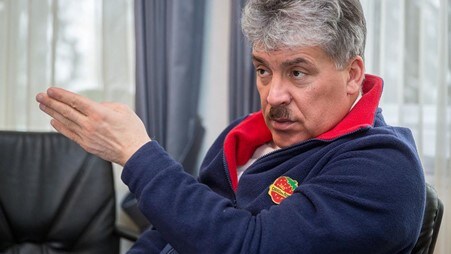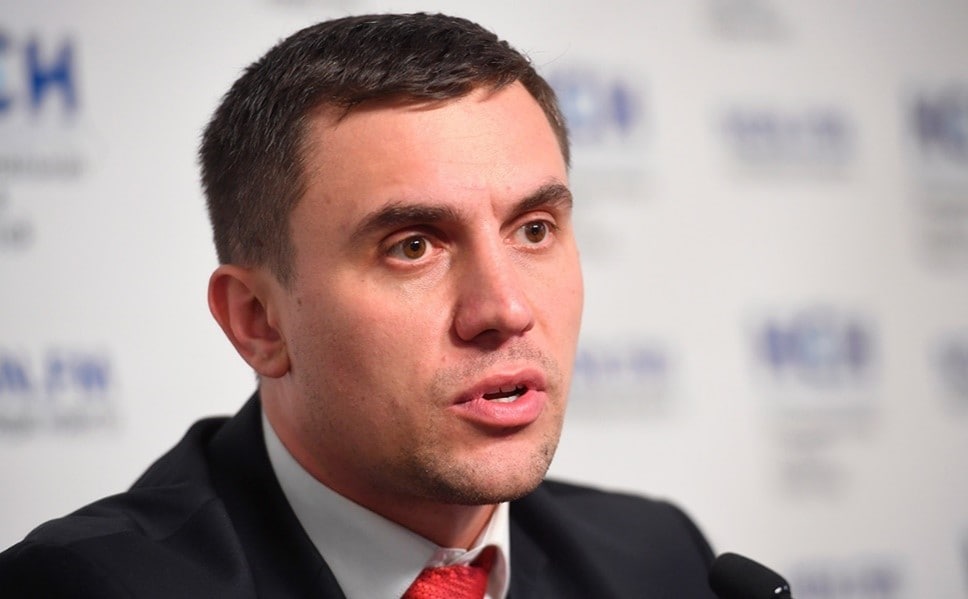As the September 19, 2021 Russian legislative elections approach, the Russian authorities have been making life difficult even for the docile pro-system opposition. The Communist Party of the Russian Federation (CPRF) has seen its third ranking candidate on the federal list to the Duma Pavel Grudinin barred from running. The pretext was that Grudinin illegally owned shares in an offshore company in Belize. Duma candidates are prohibited from owning such assets. The information was provided by Grudinin's ex-wife, who divorced him for marital infidelity and is now in the midst of a property fight with him. Grudinin claims that he has not held foreign assets since 2017 before his 2018 presidential run against Vladimir Putin. In that election Grudinin was cast as Putin's ineffective sparring partner, but surprised the Kremlin by making a respectable showing, something that the Kremlin has neither forgotten nor forgiven.[1]
Grudinin's protestation of innocence and the questions surrounding the charges against him are immaterial. He is barred from running until the case against him is closed.

Pavel Grudinin (Source: Vedomosti.ru)
Nikolai Bondarenko a Communist deputy in the Saratov Oblast Duma deputy, who is running for the State Duma protested Grudinin's exclusion at a Central Election Commission meeting. He claims to have lambasted Central Elections Commission Chair Ella Pamfilova: "This is a disgrace! You are destroying democracy and elections."
Pamfilova shot back "You said that it’s a disgrace. But what is? We had to make this decision, because for us, the law is the letter from the prosecutor’s office, which claims that he [Grudinin] has [foreign] accounts. And the documents confirm it... When you’ll have a majority, when you’ll come to power and make laws, we will execute them!".
"Ella Alexandrovna [Pamfilova], we will come [to power], millions of us will," retorted Bondarenko.[2]
However, Bondarenko himself may soon face disqualification. Bondarenko, who runs a popular blog on YouTube, claims that the Interior Ministry wants to open a criminal case against him for distributing extremist material in the social networks, i.e. a video by the imprisoned opposition leader Alexei Navalny where he called the ruling United Russia Party the party of crooks and thieves. The video was posted in 2011, whereas the court ruling that this was extremism only appeared in 2013.[3]
The attack on Bondarenko continued in the pro-government media. Political analyst Oleg Matveichev commented on Bondarenko's refusal to answer the question about Crimea’s status:
"And this is where betrayal is occurring. He [Bondarenko] started with criticism of the government for its shortcomings, but now he effectively criticizes the constitutional order, because our Constitution states that Crimea belongs to Russia. Therefore, Bondarenko undermines the cornerstones of our statehood and our territorial integrity," concluded Matveichev.[4]

Nikolai Bondarenko (Source: Rbc.ru)
The CPRF has attempted to push back. At a press conference, CPRF leader Gennady Zyuganov announced a nationwide rally in support of the party’s nominees for the Duma, "who are now being persecuted". According to Zyuganov, in addition to Grudinin and Bondarenko, Sergey Levchenko, ex-governor of Irkutsk Oblast, and Ivan Kazankov, First Secretary of the CPRF Mari Republican Committee also faced disqualification. The Communist Party planned court action to defend Grudinin's candidacy.
Dmitry Novikov, Deputy Chairman of the CPRF Central Committee, who spoke at the same press conference denounced the "political persecution" of his party, but claimed that this persecution proved that Communists were "the main opposition force" to the ruling United Russia Party.[5]
The veteran journalist Konstantin Eggert speculated on what lies behind this concerted attack on the Communist Party that poses no threat to Putin's power? Perhaps the Kremlin is running scared; maybe the crackdown against the opposition that started with Navalny has acquired of its own and is engulfing even regime loyalists, and perhaps the authorities have tired of the charade of elections and pseudo-opposition parties.
Eggert's analysis follows below:[6]

Konstantin Eggert (Source: Kommersant.ru)
"There are varying explanations for the authorities’ hysteria on the eve of the September 19 [elections]. However, in any case Russia’s prospects inspire scant optimism.
"How come in the upcoming September 19 competition to fill the vacant positions in the Presidential Administration department called the 'State Duma,' will the Kremlin's efforts take place in a setting resembling the eve of World War III?
"There has not been a truly competitive election to this institution since 1999. Since 2003, not a single party in Duma even resembles a democratic force. The last time deputies disagreed with the current regime’s viewpoint on anything was the protest vote by deputies Dmitri Gudkov and Ilya Ponomarev on the law on 'return of Crimea to Russia' back in 2014.
"The so-called opposition votes with United Russia (UR) on all issues that are truly important for Putin, for instance: the zeroing of presidential terms, the conflict with the West and Ukraine, heightened military expenditures, expansion of the special services’ powers, the struggle against Navalny and other "extremists", etc. The only deputies, who oppose the "general line" are Zhirinovsky, who demands nuclear bombings, and Zyuganov with his signature incantations about the hard life of pensioners and the dilapidated USSR legacy.
"This circus worked without a hitch. So why did the Kremlin get so scared of the upcoming reappointment of its Duma puppets that it not only purged the entire media field and crushed Alexei Navalny’s headquarters network, but also slapped down its most loyal servants, such as the Communist Pavel Grudinin? True, Grudinin got 11% of votes in the 2018 presidential elections, so what? Putin himself asked him to play the role of presidential candidate. And if Grudinin would’ve gotten into the Duma, how could it possibly bother Vladimir Vladimirovich [Putin]? Honestly, for all its symbolic value, even Navalny’s "smart voting" wouldn’t be able to fundamentally shake the cornerstones of Putin’s regime. And we are talking merely of Grudinin.
"Navalny in jail, his associates either behind the bars or in exile. This is a tragedy. However, preventing the millionaire Grudinin from getting into the Duma mandate is a comedy, a farce. It looks as if Samuel Beckett had rewritten the early absurdist plays of Vaclav Havel with [Russia’s favorite TV presenter] Ivan Urgant’s help. So one has to propose a theory. There are three of them.
"Version one: the failed assassination attempt on Navalny prompted the Russian special services to massively purge the entire political field in order to prevent future "glitches " and eliminate risks in general. A year later, this campaign to eliminate any political alternative has acquired a logic of its own and has led to the gradual liquidation of even the super-loyal pseudo-opposition. The system devours itself, no one can consider himself safe.
"We are watching a movie called 'Comrade Stalin, there has been a horrible mistake – 2' movie, however without Article 58 [of the Soviet Criminal Code] and 'ten years without the right of correspondence' [the Stalinist Soviet Criminal Code which imposed this draconian condition for "counter-revolutionary activity"]. This scenario suggests that Putin has distanced himself from current affairs in order to meet with Biden, prepare for a new round of Ukraine conflict, absorption Belarus… and for his conversations in absentia with Stalin, Chamberlain, Pilsudsky, and Mannerheim [via articles Putin publishes].
"Version two: the next convocation of State Duma will have to pass such important decisions concerning Putin’s political future that he is personally engaged in its selection. In this case, it seems, even "zeroing" failed to solve all Putin’s problems.
"Version three: The Kremlin knows something about the sentiments of the 'Putin majority' that remains inaccessible to independent sociologists. The country’s economy and social sphere after the pandemic is not really in good shape, and people’s discontent (which at times is absolutely irrational) with the incomprehensible state’s COVID-19 policy has become noticeable. The UR ratings are falling.
"Sociological polls in authoritarian countries are only partially reliable, thus the UR ratings may be dropping even faster than we are told. But there are still no signs of a revolution. And ultimately Putin has [Central Elections Commission Chairman] Ella Pamfilova, three-day voting, the North Caucasus, Tuva and Crimea [where the authorities can pad the vote], no video surveillance [at the polling stations], hundreds of thousands of election commission members always ready to 'stuff in' the missing ballots for UR.
"There is also a fourth version – a combination of the previous ones. It seems that the authorities are one by one eliminating the safety valves for releasing the steam of social discontent, destroying the pretense of [political] institutions and imitation politics on all its levels. This means assuming responsibility for all that is happening. The Kremlin might think that it is reducing the risks to a minimum. Critics of the Kremlin believe that the 'end is nigh' and that their time will soon come. It is quite possible that both are wrong. Tragicomedies often conclude unexpectedly and unhumorously."




